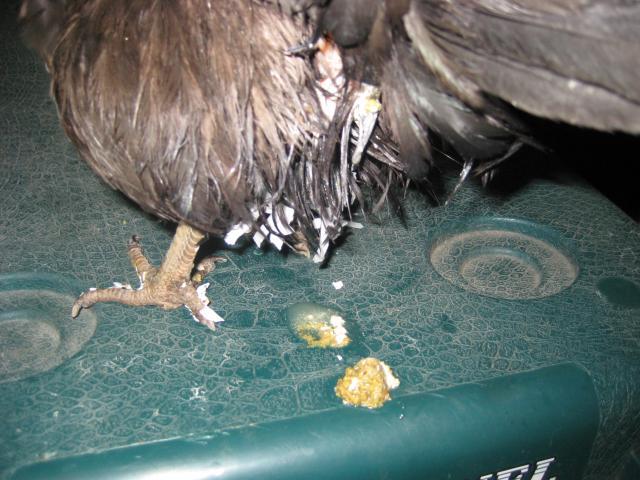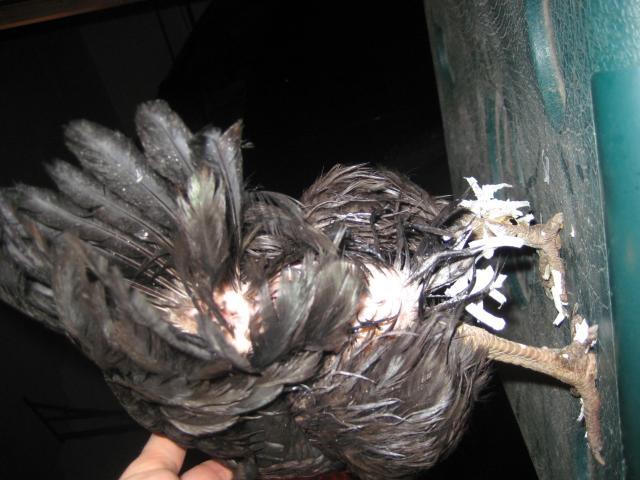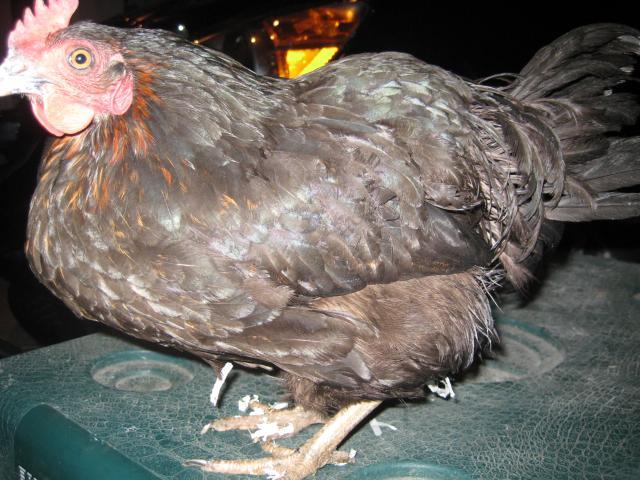The images in the Original Post are not of Vent Gleet.
From my experience and the description provided, I'd say that bird is "Egg Bound".
(or as I called it growing up, "she has a stuck egg")
I know I'm getting to this very late, but I figured late insight is better than no insight... for this is a "common" difficulty with hens and I'm sure some one else will appreciate help with their beloved hens or utility layers.
Normally the bird will overcome and lay eventually, but this is not always the case.
(This kind of situation will be reoccurring in any hen that has already had it once, but as hens don't typically lay more than a few years it's not too big a deal... just avoid breeding the hens that have this attribute and perhaps it will be bred out of your flock... though that has it's own weight of uncertainty to consider.)
Options:
1) wait and see (she may die, she may lay the egg)
2) bathe her in warm water, salty or not. (You can also use vegetable oil on her vent to lube things up; my mom used soap once.. that was odd.) Dry her with a hair dryer on low, after toweling dry as much as possible.
3) Very dangerously you can attempt to break and remove the egg yourself; this can lacerate her inside, some times, and she might heal just fine from the lacerations.
4) Cull (kill) the bird.
I understand that there are two uses of back yard birds; Utility and Companionship.
In my life I have had birds for both reasons, so I rarely have culled any of them, so you will need to weight the utility of each bird to it's worthwhile companionship and decide what is best for you and the bird; some people consider it a merciful thing to cull in this case.
Relevant Appendix:
What is my background?
I have been raising poultry since 1986, taking the years of 2004-2011 off; now I have 3 hens in my tiny back yard.
At the largest I had a flock of 54 hens, 14 rooster, 2 turkeys, 7 geese, and 1 drake.
I raised pure bred Large Standard Breed Rhode Island Red birds for 6 years before my 2 genetic strains died out; RIR pure bred had only 7 genetic strains/groups left in the USA (possibly the world) back in the 90's when I was breeding them. They commonly produce a variety of "mutant" offspring and the ones that fit the standard typically die from sickness with in 2 years of hatching.
I also studied Avian Sciences, as a hobby, from age 6-16 and was on a team of middle-high school aged people that won 1st in state and 1st in National "Avian Bowl" competitions in 1995 under the guidance of Dr. Francene Bradley (of UC Davis).
TLDR Appendix:
Since then I have forgotten most of that meaty detail, but I do remember bathing at least 10 different birds, over the years, for being egg bound, and breaking 3 different eggs in attempt to help clear the reproductive tract; all attempts were effective, though obviously quite painful to the hens.
Trivial Appendix:
The Oldest bird I had was a rooster named "Roasty Toasty", from my very first group of birds, who lived from 1986-1998, far surpassing what was considered "possible" according to poultry standards when I was learning about Avian diseases. One of his sisters of the same group died the year before that, 2 others the year before her. I had a very good track record at keeping my family of birds alive and laying, though the longest a bird ever laid was 6 years and she was a bantam who didn't lay too often by the end.
I used to wash my show birds every week, at one point, just with dry cleaning methods and vegetable oils on the skin. I decided that was excessive and moved to wash them in this way only in the month before shows, and with water the week prior.
Anyway... I hope this has been informative.
I have a hen I am pretty sure is egg bound right now, and I should probably get to helping her out soon.
Peace.





